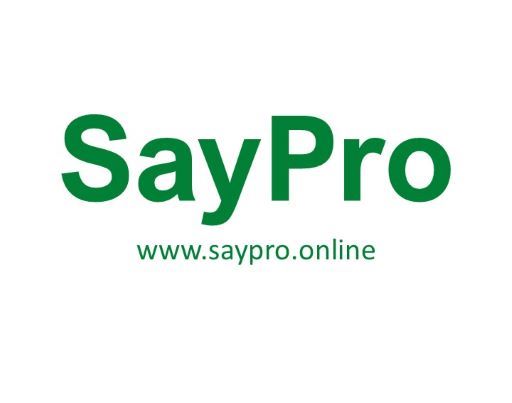Once participants have completed their sample tender draft as part of the SayPro Monthly February Government Department and Municipality Tender Application Training Workshop, they can submit their draft for expert feedback. This process provides an opportunity for participants to receive personalized, professional insights from experienced SCMR instructors and industry experts, which will help refine their tender applications and improve their chances of success in future tenders.
How to Submit Your Draft for Feedback:
- Prepare Your Tender Draft:
- After completing the mock tender documents using the materials and templates provided in the workshop, ensure that all sections of the tender are filled out accurately.
- Double-check your compliance with the eligibility criteria, documentation requirements, and pricing proposals.
- Review your work to ensure clarity and professionalism, making sure it is ready to be submitted for review.
- Upload Your Draft to the SayPro Platform:
- Log in to the SayPro online platform where you participated in the workshop.
- Navigate to the post-workshop submission section, where you will be able to upload your completed tender draft for expert review.
- Ensure all documents are correctly formatted and that any necessary supporting materials (such as pricing breakdowns, eligibility certificates, or compliance documents) are included.
- Submit for Feedback:
- Once your draft is ready, submit it directly to the platform. After submission, the SayPro team will assign an expert reviewer to evaluate your tender draft.
- You will be notified when your feedback is ready for review.
- Expert Review and Suggestions for Improvement:
- SCMR experts will thoroughly assess your draft, focusing on the following key areas:
- Completeness: Ensuring that all sections are filled out and meet tender requirements.
- Clarity and Professionalism: Checking that the documents are clear, concise, and well-organized.
- Pricing Model: Verifying that the pricing proposal is realistic, competitive, and aligns with the tender guidelines.
- Compliance: Ensuring that all eligibility criteria, documentation, and submission guidelines are met.
- Experts will provide detailed feedback, highlighting areas where improvements can be made and suggesting specific actions to enhance the overall quality of the tender.
- SCMR experts will thoroughly assess your draft, focusing on the following key areas:
- Review the Feedback:
- Once you receive the feedback, take the time to carefully read through the expert’s comments and suggestions.
- Identify areas where you can strengthen your tender application, whether it’s revising certain sections, adjusting the pricing proposal, or ensuring full compliance with the tendering guidelines.
- Make Revisions:
- Use the expert feedback to revise your tender draft. Focus on the areas where the expert identified room for improvement.
- This revision process will help you sharpen your skills and better understand the nuances of preparing a successful tender application.
- Submit Final Version (Optional):
- If you choose, you may submit your revised tender application for a second round of feedback to ensure you’ve fully addressed all suggested improvements.
- This iterative process helps ensure that your tender application is as strong as possible.
Benefits of Submitting Your Draft for Feedback:
- Personalized Expert Insights:
- The feedback you receive is tailored to your specific draft, allowing you to address any weaknesses and improve the quality of your submission. You’ll gain valuable guidance from industry experts who know what government procurement teams look for in tenders.
- Increased Tender Success:
- By incorporating the expert suggestions, you will be able to refine your tender application, ensuring it meets all requirements and stands out in the highly competitive government procurement market.
- Improvement of Tender Skills:
- This feedback loop is a valuable learning opportunity. With every draft you submit and revise, you’ll improve your tendering skills, becoming more adept at preparing complete, compliant, and competitive tenders.
- Confidence in Your Submission:
- Receiving professional feedback will give you the confidence to submit future tenders, knowing that you have taken the necessary steps to ensure your applications are of the highest quality.
- Clarification of Complex Aspects:
- If you encountered challenges during the tender drafting process, the feedback will help clarify any confusing aspects, whether related to pricing, compliance, or tender form completion.
- Ongoing Learning:
- Even after the workshop ends, the feedback you receive helps you continue to learn and develop your understanding of the tendering process. This feedback provides a long-term benefit as you apply it to future bids.
Tips for Maximizing Feedback:
- Be Thorough in Your Submission:
- Submit your best work by thoroughly completing all sections of the tender form. The more complete and detailed your submission is, the more valuable the feedback will be.
- Ask Clarifying Questions:
- If the feedback is unclear or you need further explanation on specific points, don’t hesitate to reach out to your instructor for clarification. Understanding the feedback in-depth will help you improve your skills and apply the suggestions more effectively.
- Act on Feedback Promptly:
- After receiving feedback, make revisions quickly to continue your learning momentum. The sooner you act on the expert’s suggestions, the better prepared you’ll be for the next tender opportunity.
- Seek Additional Help if Needed:
- If you feel unsure about making the necessary changes or need further guidance, you can always request additional support or even schedule a one-on-one session with the instructor for more in-depth assistance.
Conclusion:
Submitting your completed tender draft for expert feedback is an essential step in mastering the government tender application process. By taking advantage of the personalized guidance offered by SayPro’s experienced SCMR instructors, you will gain critical insights into the quality and compliance of your tender, allowing you to make the necessary improvements before submitting it to government departments or municipalities.
This post-workshop task helps reinforce your learning and significantly boosts your confidence and success rate in future tenders. With expert feedback, you can ensure that your tender applications are not only competitive but also fully aligned with government procurement standards, increasing your chances of securing contracts.
